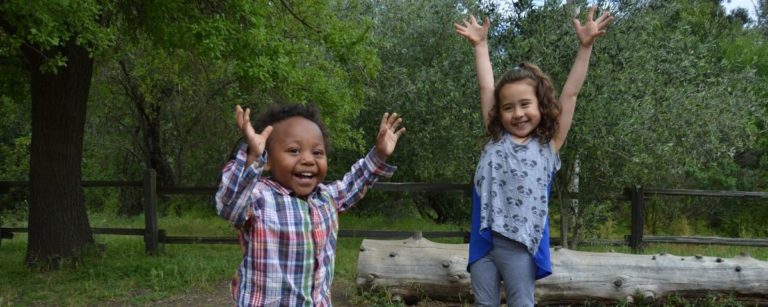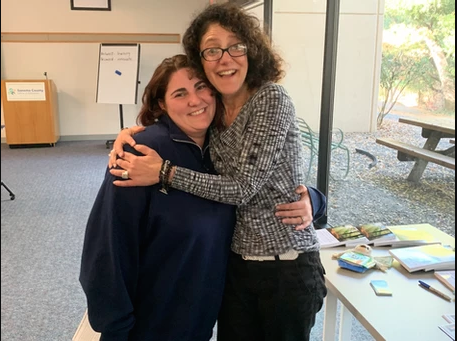A Village & Respite are Essential for the Foster Parenting Marathon!
By JoAnne Morris
Several years before Help One Child came to be, Mark and I were foster parents three times. All three little girls were under the age of three, and one of them was particularly challenging for us to parent. Other foster parents told us that we were lucky, that behaviors often become a lot more challenging as the children grow. When that child reunified with her Mother, it was a huge relief. Being a foster Mom was the most worthwhile thing I had ever done, but I felt I couldn’t do it anymore. It was exhausting. And yet I still wanted to try it again, but to keep going I would need a lot more help. We needed to form…a “village,” and not just any old village! It would require a village trained to help children who come from really hard places. And I needed some training myself!
Consider some of the challenges that foster parents have to navigate, and why even one person could be helpful. Actually a WHOLE VILLAGE of helpers could make all the difference in the world for both the children impacted by foster care and their foster parents. When parenting children who have experienced disrupted attachment, ambiguous loss of separating from their first families, and early childhood trauma (possibly only in utero), it gets complicated, and love is not enough.
Here is a list of why respite and parent “time outs” are so important for those in the resource parent, relative caregiver, or adoptive parent marathon.
- Children in foster care need taken to supervised visits with their parent(s), sometimes several times a week.
- Children in foster care must be taken to routine (and sometimes urgent) medical appointments, and some children need additional assessments and ongoing follow-up (occupational/physical therapy and behavioral counseling.)
- Children in foster care can need help catching up to grade level at school, and like all kids, need to participate in sports and after school activities.
- Foster parents need to attend court appointments to be sure the judge has been updated on current facts about the child.
- If the child cries or gets up during the night, the foster parents are up during the night, too!
- If the child has the habit of running away, foster parents need to build a relationship with local police to so they know the situation before it happens.
- Foster parents have to consider the needs of their whole family while being hyper focused on the needs of their foster children. Juggling after-school activities, appointments, and day-to-day routines can be daunting!
- If children in foster care are not allowed to travel outside the area due to birth family objections or interference with court ordered visits, finding another approved resource family for respite is necessary.
- If children in foster care have never been to church, it may take awhile for them to learn to adjust to an unfamiliar routine and behave as expected there. Foster parents educate the church family about supporting and love our children who may have higher needs.
- The foster parent, above all things, must find time to be trained on how to recognize and address the child’s trauma, grief, anger, learning challenges, adjustment to a new family, and adjustment to a new school, new teacher, new friends, etc. This education is essential!
And of course, all parents need to take “time-outs” for themselves!
For these and many more reasons, every foster and adoptive parent needs a knowledgeable and loving village of friends or family members who can come alongside them while they are parenting vulnerable children. This strengthens the whole family system and can build a solid foundation for a child to grow. It is invaluable for their future to have a strong family and supportive friends, no matter how long the children are in care.
Help One Child recruits churches and individuals to provide this kind of love and support for children and struggling families. These “parent night out” events offer breaks and respite opportunities, and make a huge difference in the lives of vulnerable children and their resource families. Take advantage of any and all respite offered. It’s a marathon, not a sprint. Your children need you to show up as the best version of yourself as a parent, as possible. This only happens with essential self-care, respite, and breaks.
As my husband says, “Never give up! Never give up! Never give up!”
A village and respite makes this possible on the marathon of parenting children from hard places.
JoAnne Morris is the co-founder of Help One Child with her husband, Mark. Founded in 1993, 30 years ago, Help One Child’s vision was to provide much needed respite for foster parents and to create a village of folks who would offer additional support to vulnerable children impacted by foster care. They learned all they could about trauma and attachment, bringing experts to the bay area on all topics related to parenting children through foster care and adoption. JoAnne’s professional background was in real estate, and over the many years of parenting children who joined their family through birth, foster care, and adoption, she and Mark have also become experts on nonprofit creation, management and the fields of trauma and attachment.









